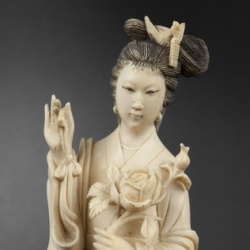Difference between revisions of "The Refuge Vows"
| Line 1: | Line 1: | ||
[[File:3N.jpg|thumb|250px|]] | [[File:3N.jpg|thumb|250px|]] | ||
<poem> | <poem> | ||
| − | Gampopa's The Jewel Ornament of Liberation explains the refuge vows in Chapter 8: | + | Gampopa's The [[Jewel]] Ornament of [[Liberation]] explains the [[refuge]] [[vows]] in Chapter 8: |
Training. There are 3 general trainings, 3 particular trainings, and 3 common trainings. | Training. There are 3 general trainings, 3 particular trainings, and 3 common trainings. | ||
| − | a) The three general trainings consist of making a constant effort to | + | a) The three general trainings consist of making a [[constant]] [[effort]] to |
| − | make offerings to the Triple Jewels, even offering whatever one eats or drinks, | + | make [[offerings]] to the Triple Jewels, even [[offering]] whatever one eats or drinks, |
| − | not forsaking the Triple Jewels even at the risk of one's life or for great rewards; | + | not forsaking the Triple Jewels even at the [[risk]] of one's [[life]] or for great rewards; |
| − | and repeatedly taking refuge by recollecting the qualities of the Triple Jewel. | + | and repeatedly [[taking refuge]] by recollecting the qualities of the [[Triple Jewel]]. |
| − | b) The three particular trainings are having taken refuge in the Buddha, one should not take refuge in other deities. The Sutra of the Great Parinirvana says: | + | b) The three particular trainings are having taken [[refuge]] in the [[Buddha]], one should not take [[refuge]] in other [[deities]]. The [[Sutra]] of the Great [[Parinirvana]] says: |
| − | One who takes refuge in the Buddha | + | One who takes [[refuge]] in the [[Buddha]] |
| − | Is the pure upasaka. | + | Is the [[pure]] [[upasaka]]. |
| − | Never go for refuge | + | Never go for [[refuge]] |
| − | To other deities. | + | To other [[deities]]. |
| − | Having taken refuge in the Dharma, one should | + | Having taken [[refuge]] in the [[Dharma]], one should |
| − | not harm other sentient beings. | + | not harm other [[sentient beings]]. |
It says in a sutra: | It says in a sutra: | ||
| − | By taking refuge in the precious Dharma, | + | By [[taking refuge]] in the [[precious]] Dharma, |
| − | One's mind should be free from hurting | + | One's [[mind]] should be free from hurting |
and harming others. | and harming others. | ||
| − | Having taken refuge in the Sangha, one should | + | Having taken [[refuge]] in the [[Sangha]], one should |
not rely on heretics. It says in a sutra: | not rely on heretics. It says in a sutra: | ||
| − | By taking refuge in the Sangha, | + | By [[taking refuge]] in the [[Sangha]], |
One should not rely on heretics. | One should not rely on heretics. | ||
The three common trainings are summarized: | The three common trainings are summarized: | ||
| − | to respect the Buddha Jewel in every form, even a piece of a tsatsa; | + | to [[respect]] the [[Buddha]] [[Jewel]] in every [[form]], even a piece of a tsatsa; |
| − | to respect the foundation of the Dharma Jewel, the books and the texts of precious Dharma, even one syllable; | + | to [[respect]] the foundation of the [[Dharma]] [[Jewel]], the [[books]] and the texts of [[precious]] [[Dharma]], even one syllable; |
| − | and to respect the precious Sangha Jewel, the dress of Buddha, even a patch of yellow cloth. | + | and to [[respect]] the [[precious]] [[Sangha]] [[Jewel]], the dress of [[Buddha]], even a patch of yellow cloth. |
</poem> | </poem> | ||
{{R}} | {{R}} | ||
Latest revision as of 07:39, 6 September 2013
Gampopa's The Jewel Ornament of Liberation explains the refuge vows in Chapter 8:
Training. There are 3 general trainings, 3 particular trainings, and 3 common trainings.
a) The three general trainings consist of making a constant effort to
make offerings to the Triple Jewels, even offering whatever one eats or drinks,
not forsaking the Triple Jewels even at the risk of one's life or for great rewards;
and repeatedly taking refuge by recollecting the qualities of the Triple Jewel.
b) The three particular trainings are having taken refuge in the Buddha, one should not take refuge in other deities. The Sutra of the Great Parinirvana says:
One who takes refuge in the Buddha
Is the pure upasaka.
Never go for refuge
To other deities.
Having taken refuge in the Dharma, one should
not harm other sentient beings.
It says in a sutra:
By taking refuge in the precious Dharma,
One's mind should be free from hurting
and harming others.
Having taken refuge in the Sangha, one should
not rely on heretics. It says in a sutra:
By taking refuge in the Sangha,
One should not rely on heretics.
The three common trainings are summarized:
to respect the Buddha Jewel in every form, even a piece of a tsatsa;
to respect the foundation of the Dharma Jewel, the books and the texts of precious Dharma, even one syllable;
and to respect the precious Sangha Jewel, the dress of Buddha, even a patch of yellow cloth.
